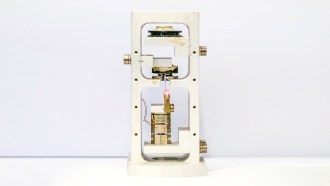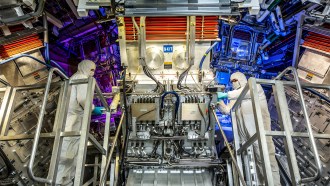Physics
-
 Physics
PhysicsNewfound ‘altermagnets’ shatter the magnetic status quo
The newly discovered type of magnetic material could improve existing tech, including making better and faster hard drives.
-
 Physics
PhysicsSeparating science fact from fiction in Netflix’s ‘3 Body Problem’
Real science underpins much of the action in the show — along with a hefty dose of artistic liberty.
-
 Physics
PhysicsPhysicists take a major step toward making a nuclear clock
By tweaking the energy of a thorium nucleus with a laser, scientists demonstrated a key step to building clocks based on the physics of atomic nuclei.
-
 Life
LifeDuring a total solar eclipse, some colors really pop. Here’s why
As a solar eclipse approaches totality and our eyes adjust to dimming light, our color vision changes. It’s called the Purkinje effect.
-
 Physics
PhysicsA teeny device can measure subtle shifts in Earth’s gravitational field
No bigger than a grain of rice, the heart of the instrument is the latest entrant in the quest to build ever tinier gravity-measuring devices.
By Adam Mann -
 Psychology
PsychologyTimbre can affect what harmony is music to our ears
The acoustic qualities of instruments may have influenced variations in musical scales and preferred harmonies.
-
 Physics
Physics50 years ago, superconductors were warming up
Superconducting temperatures have risen by about 250 degrees since the 1970s, but are still too cold to enable practical technologies.
-
 Particle Physics
Particle PhysicsForests might serve as enormous neutrino detectors
Trees could act as antennas that pick up radio waves of ultra-high energy neutrinos interactions, one physicist proposes.
-
 Physics
Physics‘Countdown’ takes stock of the U.S. nuclear weapons stockpile
Physicists grapple with their role as stewards of the United States’ aging nuclear weapons in the new book by Sarah Scoles.
-
 Physics
PhysicsPhysicist Sekazi Mtingwa considers himself an apostle of science
After big contributions in accelerator physics, Sekazi Mtingwa has been focused on opening science for everyone.
By Elise Cutts -
 Physics
PhysicsHere’s how scientists reached nuclear fusion ‘ignition’ for the first time
The first fusion experiment to produce an energy excess required meticulous planning and also revealed a long-predicted heating phenomenon.
-
 Plants
PlantsHere’s why blueberries are blue
Nanostructures in a blueberry’s waxy coating make it look blue, despite having dark red pigments — and no blue ones — in its skin, a new study reports.